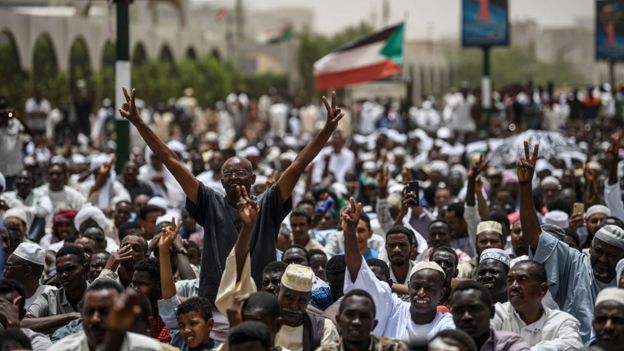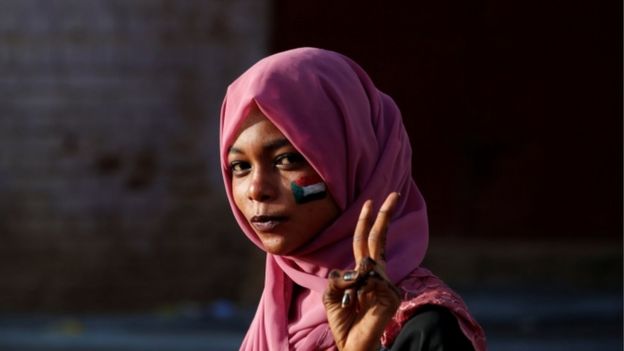
This article is more than
6 year old
Security services found euros, dollars and Sudanese pounds totalling more than $130m (£100m).
The ex-leader was placed under house arrest after months of protests led to his removal.
Reports say Mr Bashir is now being held at the Kobar high-security prison.
A source in Sudan's judiciary told Reuters news agency that suitcases loaded with more than $351,000, €6m ($6.7m; £5.2m) and five billion Sudanese pounds ($105m) were found at Mr Bashir's home.
The source also confirmed Mr Bashir was under investigation, telling Reuters prosecutors would "question the former president in Kobar prison".
A picture carried by the Netherlands-based media outlet Radio Dabanga shows men in army uniforms standing over what appears to be several sacks full of cash.
#Sudan authorities seize Al #Bashir cash stash #bashirhasfallen #SudanNews #SudanProtests #SudanUprising #Sudan_Revolts #Sudan_UpRising https://t.co/sup6OnZ9TP pic.twitter.com/oPID9FZNhI
— Radio Dabanga (@Radiodabanga) April 19, 2019
The money, which Radio Dabanga says was shown to reporters, was stuffed in bags designed to contain 50kg (110lbs) of grain.
On Saturday, Sudan's attorney general said a new committee would be set up to oversee anti-corruption investigations.
But despite moves to hold Mr Bashir and others to account, Sudan's army does not appear to have the confidence of protesters demanding civilian rule, BBC Africa correspondent, Alastair Leithead, says.

Alastair Leithead, BBC News, Khartoum
The mass sit-in continues in the centre of Khartoum, amid a lack of trust that the military council is committed to handing over power to a civilian transitional authority.
Each day concessions are announced, but there's little proof that what's been promised has been delivered.
There have been no images of the former president in prison, nor any response from the generals over a demand they give up power to a civilian administration.
The general public prosecutor's announcement that Mr Bashir is being investigated for money laundering after cash was found at his home is news the demonstrators would like to hear.
The Sudanese military toppled Mr Bashir on 11 April but demonstrators, led by The Sudanese Professionals Association, have vowed to stay on the streets until there is a move to civilian rule.
Mr Bashir, who ruled Sudan for almost 30 years, is wanted by the International Criminal Court (ICC) for alleged war crimes in the country's western Darfur region.
Sudan's military, however, says it will not extradite him and will try him in the country instead.
Uganda would consider offering the deposed leader asylum if he applied, the country's Minister for Foreign Affairs Henry Oryem Okello told Reuters.
Until this week, Mr Bashir's whereabouts since his removal were unknown.
The coup leader at the time, Awad Ibn Auf, said Mr Bashir was being detained in a "safe place".
He himself stood down soon afterwards, with Lt Gen Abdel Fattah Abdelrahman Burhan named as head of the transitional military council.
Demonstrators remain camped out at military headquarters in the Sudanese capital, Khartoum.
Huge crowds braved scorching heat and fatigue for a 14th day on Friday, demanding that the military council hand over the reins of power to a civilian authority.
Plans to unveil a civilian body to replace the military council will be announced on Sunday, the SPA said in a statement.
Ahmed Rabi, leader of the SPA, told The Associated Press that he and others behind the protest movement met the military council on Saturday.
It is the third such meeting between them, with no sign of a breakthrough to end the deadlock.
So far, the SPA has been uncompromising in its demands, fearful of a military-led administration stuffed full of Mr Bashir's allies.
An SPA spokesman previously told the BBC that the group "completely rejected" the transitional military council leading the country, and said protesters seek the dismantling of state intelligence agencies and the "full dissolution of the deep state".

Military council has announced a raft of new measures, including the end of censorship and new heads of the security forces.
The council has arrested former government members and says it will put in place whatever civilian government and whichever prime minister opposition groups agree.
But while the council promised not to remove protesters from their sit-in, it has also called on them to stop unauthorised roadblocks and "let normal life resume".
"Taking up arms will not be tolerated," military council spokesman Maj Gen Shams Ad-din Shanto said last week.